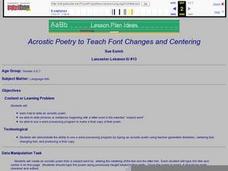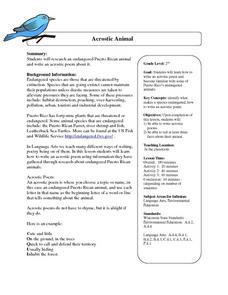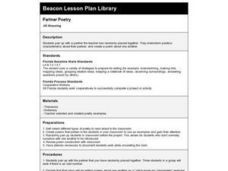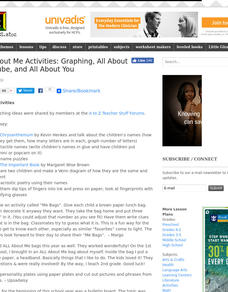Curated OER
Acrostic Poetry to Teach Font Changes and Centering
Young scholars engage in a discussion about how to write an acrostic poem. They demonstate the ability to use a word processor by typing an acrostic poem by following instructions. Word processing skills such as, centering text, changing...
Curated OER
Acronyms--Characters in The Hobbit
Have your class create acrostic poems for characters in The Hobbit. First, define acronyms and work together to complete sample acronyms for their own first names. Students then research specific characters in the novel and create...
Curated OER
Animal Poems
Students create their own acrostic poems. In this poetry lesson, students read poetry book to view examples of acrostic poems. Students then write an acrostic poem using their name.
Curated OER
Acrostic Poems
Second graders listen to the book, SHARK WATCH as it is read to the class and name some of the facts they have learned about sharks from hearing the story. They then write an acrostic poem on the topic of sharks. Some of the students...
Curated OER
Acrostic Poems: What's In a Name?
Young scholars find words that begin with the letters in their own names, using a variety of sources including word banks and online dictionaries. They create an acrostic poem. Pupils revise poems as needed, for meaning and...
Alabama Learning Exchange
Landforms Acrostic Poetry
Fourth graders apply scientific information about various landforms. They use the information to write and word process acrostic poems which they illustrate with clip art or pictures from magazines.
Curated OER
ACROSTIC POETRY
Learners use newspapers or magazines to create an acrostic poem where words are divided into parts of speech.
Curated OER
Poetry
Fifth graders are introduced to poetry and many authors who create it. In this language arts lesson, 5th graders create a class poetry book. Each student submits an original poem, along with an illustration.
Curated OER
Acrostic Animal
Second graders listen as the teacher describes how an acrostic poem is written. They research an endangered animal of Puerto Rico. Students write an acrostic poem as a class, and then individually about the animal they research. Students...
Curated OER
What's In a Name?
Students write a story. In this identification lesson, students write their name vertically and think of a word or phrase to match each letter. Students write a paragraph or story based on their name descriptions.
Curated OER
No Need To Be Puzzled About Me
Fourth graders investigate acrostic poetry by researching the Internet. In this poetry writing lesson plan, 4th graders complete a worksheet detailing their personal activities and interests. Students view the form of an acrostic poem...
Curated OER
Who Am I?
Pupils complete an acrostic poem and use digital photo activities for the poem. For this acrostic poem and technology lesson, students use Word Art and digital cameras to create a technology integrated acrostic poem.
Curated OER
What's In a Name?
Young scholars research Cabeza de Vaca and other conquistadors. They review how names were given to Alvar Nunez Cabeza de Vaca's family and discuss the achievements, risks, experiences, and characteristics of de Vaca. They write an...
Curated OER
Naming Trust
Students write a poem. In this character lesson, students read a quote about trust and friendship and discuss what they mean. Students write an acrostic poem using the letters in their name and come up with a phrase or word that...
Curated OER
Poetry Anthology of Basic Forms
Students explore the format of the following poetic forms: acrostic, haiku, cinquain, diamente, and free-verse.They create a handbook or anthology of these poetic forms, with at least one sample of original work in each format.
Curated OER
Novel Character Study
Students complete a character study using a database to compile information from a novel. They design a five slide presentation highlighting the character's reaction to different situations in the book. They write an acrostic poem using...
Curated OER
Commemorative Coin Poetry
Students discuss and research an individual or event that has been memorialized on a commemorative coin. They use the information they found to write acrostics, creating stand-up accordion books to display the poems.
Alabama Learning Exchange
Our Solar System
Second graders research the Solar System using the Internet to complete questions. They sing The Planet Song and study the names of the planets using an acrostic poem. They write descriptive paragraphs with a partner with whom they check...
Curated OER
Partner Poetry
Students interview each other to get to know one another better. They discuss hobbies, achievements, sports, and music. Then they each write a poem about their partner.
Curated OER
All About Me
This is an awesome resource for any elementary or middle school teacher about to start a new school year! This resource includes an extensive list of activities for introducing the members of your class to each other. Some of the ideas...
Curated OER
Jorge Luis Borges and His Life
Students use the internet to research the life of Jorge Luis Borges. Individually, they complete a worksheet noting the important facts from his life and the books he published. They identify words they do not know the meaning and...
Curated OER
Rhyming Fruits and Vegetables
Students describe fruits and vegetables using rhyming verses. They discuss the Five Fruits and Vegetables a Day campaign and rhyming words, and create a rhyming riddle using the "Rhyming Riddles" worksheet.
Other popular searches
- Examples of Name Acrostic
- Acrostic Name Poems
- Name Acrostic Poems Fruit
- Name Acrostic of Biology
- Name Acrostic Poems Jamie
- Classroom Name Acrostic
- Name Acrostic Drug
- Name Acrostic of Drug
- Name Acrostic Andrea
- Name Acrostic Poemsulia
- Name Acrostic Poems Jamire
- Name Acrostic Poems Jam Ire






















